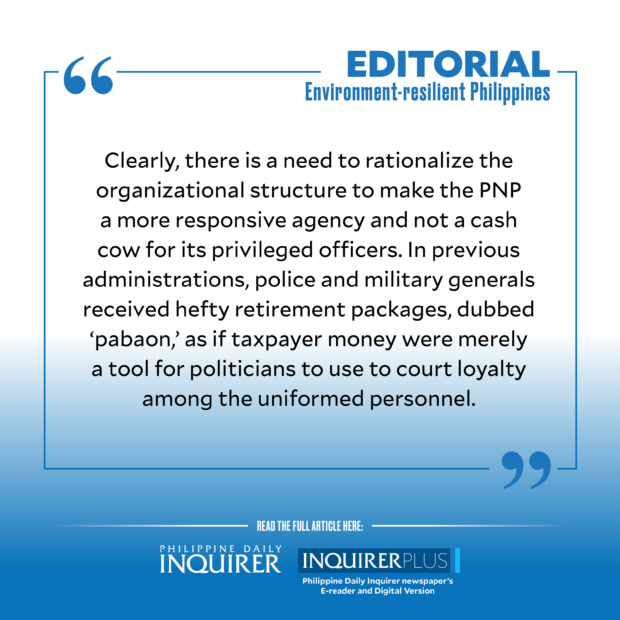Environment-resilient Philippines
In the Philippines, light rain that falls continuously can oftentimes turn some roads into chokepoints that slow down vehicular and pedestrian traffic.
But heavy rains that pour for even just a few minutes at the wrong time—say, during high tide when the drainage systems of urban centers perform at their least optimal—can bring even the main thoroughfares of Metro Manila with heavy flooding.
Article continues after this advertisementThis is what happened last week on Edsa, the main vehicular artery of the metropolis which was rendered useless for a few hours due to “gutter-deep” floods which were, in reality, much higher than that, and enough to deter even the bravest drivers of large vehicles like buses from fording the waters.
Just a few days before that, the capital and its environs were enveloped by smog which government scientists attributed to thermal inversion where cooler air traps warmer gases like those from vehicle emissions close to the ground.
Its effect on the city’s denizens was similar to that of rain-induced flooding: everyday life ground to a halt as office work was curtailed and schools were shut for the duration of the phenomenon.
Article continues after this advertisementWhat these two distinct incidents should make clear to everyone is that the lives of Filipinos are increasingly being affected on a micro level every single day by our changing environment, so much so that our normal routines are now more often disrupted by heavy rains, super typhoons, flooding, polluted air or dirty water, among others—more than what we have been accustomed to over the years.
And based on what our scientists are telling us, the problem will only get worse.
Because of this, it is time for our leaders in the public and private sectors to come together to reexamine and formulate a comprehensive plan that will make the Philippines more resilient to climate change, as well as to prevent its further degradation through human activity.
But an effective effort on this front cannot be made by the government alone or the private sector acting by itself. Transforming the country’s society into a more robust system that can withstand the environmental changes that are upon us will require the resources of everyone: the state, private enterprise, and the broader public.
More importantly, it will require all stakeholders to let go of their current mental frameworks of viewing each other with, at best, suspicion and, at worst, outright antagonism.
A good place to start would be the Department of Environment and Natural Resources (DENR), under the leadership of its current head, Secretary Ma. Antonio Yulo-Loyzaga. She has ruffled a few feathers with her science-based approach that separates good from bad corporate undertakings with a fine-toothed comb, instead of painting everyone black or white with broad brushstrokes.
An avowed environmentalist and scientist, the DENR chief has opened the doors to sustainable mining by allowing companies that comply strictly with the laws to operate unharassed, while turning the focus of environmental regulators against those who don’t.
Going forward, an open and proactive mind like Loyzaga’s should be the standard for our policymakers, whether at the national or local levels, when designing climate-resilient infrastructure that will allow Filipinos to maintain a semblance of normalcy in their daily lives even when the rain pours down or when smog envelops the city.
Roads and highways, whether made by the government or the private sector, must be designed with the evolving environment in mind and future-proofed with science to avoid paralyzing the economy when the weather is unfavorable. The government’s infrastructure programs must be freed of corruption to ensure that projects do not end up being substandard and therefore susceptible to the elements.
The same science-based mindset should be applied to infrastructure projects that the country needs for its economy to progress, instead of allowing appeals to emotion to the public to bog them down or stop them entirely.
As it stands, the Philippines’ public infrastructure is antiquated for the most part and crumbling in some parts. Our present mass transit system is ill-suited to meet the needs of a growing population and a growing economy, leaving most commuters with little choice to travel by road. And as we’ve seen, our roads get flooded easily, our airports get bogged down regularly by technical problems, and much of our sea transport systems are unsafe.
President Marcos needs to convene a multisectoral group that will bring together the country’s best minds from government, the private sector, and advocacy groups to dialogue and formulate a comprehensive policy where everyone wins by yielding a little.
The alternative is for Filipinos’ lives to continue to be put on hold whenever nature throws a tantrum.

















